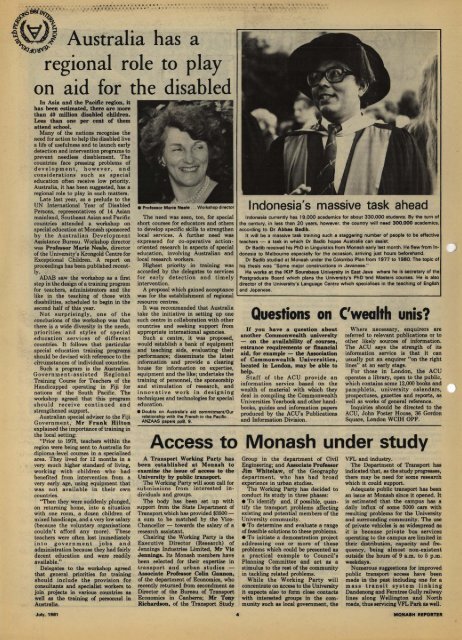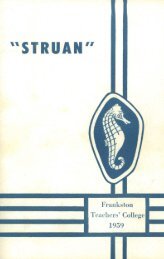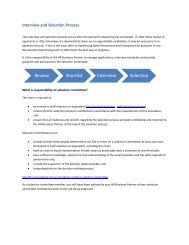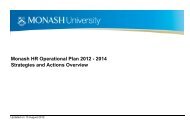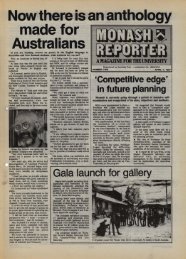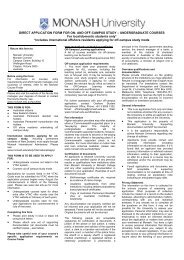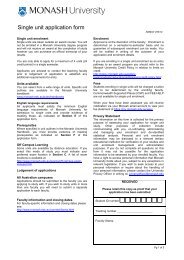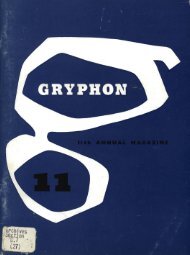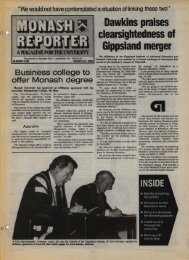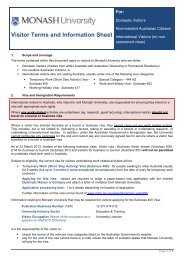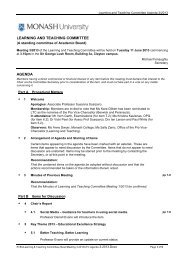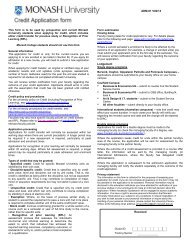No.5-81 July - Adm.monash.edu - Monash University
No.5-81 July - Adm.monash.edu - Monash University
No.5-81 July - Adm.monash.edu - Monash University
- No tags were found...
Create successful ePaper yourself
Turn your PDF publications into a flip-book with our unique Google optimized e-Paper software.
d.'~'~ "'".. .. " ... .... .. .... .... . \ .~.. . . . , .. .', '" . . . ..J . I.' .'." ' .II.••• I_• • • I I • . ~ • • .• • '. ~ '"' .... • • ~ • '. t... •'."l~~) Australia has aregional role to playon aid for the disabledIn Asia and the Pacillc region, Ithas been estimated, there are morethan 40 million eIIsabled children,Less than one per cent of themattend school.Many of the nations recognise theneed for action to help the disabled livea life of usefulnesa and to launch earlydetection and intervention programs toprevent needless disablement. Thecountries face pressing problems ofdevelopment. however. andconsiderations such as special<strong>edu</strong>cation often receive low priority.Australia, it has been suggested, has aregional role to play in such matters.Late last year, as a prelude to theUN International Year of DisabledPersons, representatives of 14 Asianmainland, Southeast Asian and Pacificcountries attended a workshop onspecial <strong>edu</strong>cation at <strong>Monash</strong> sponsoredby the Australian DevelopmentAsaistance Bureau. Workshop directorwas Professor Marie Neale, directorof the <strong>University</strong>'s Krongold Centre forExceptional Children. A report onproceedings has been published recent·Iy.ADAB saw the workshop as' a firststep in the design of 8 training programfor teachers, administrators and thelike in the teaching of those withdisabilities, sch<strong>edu</strong>led to begin in thesecond half of this year.Not surprisingly, one of theconclusions of the workshop was thatthere is a wide diversity in the needs,priorities and styles of special<strong>edu</strong>cation services of differentcountries. It follows that particularspecial <strong>edu</strong>cation training programsshould be devised with reference to thecircumstances of individual countries.Such a program is the AustralianGovernment-assisted RegionalTraining Course for Teachers of theHandicapped operating in Fiji fornations of the South Pacific. Theworkshop agreed that this programshould receive continued andstrengthened support.Australian special adviser to the FijiGovernment, Mr Frank Hiltonexplained the importance of training inthe local setting:"Prior to 1978, teachers within theregion were being sent to Australia fordiploma-level courses in a specialisedarea. They lived for 12 months in avery much higher standard of living,working with children who hadbenefited from intervention from avery early age, using equipment thatwas not available in their owncountries."Then they were suddenly plunged,on returning home, into a situationwith one room, a dozen children ofmixed handicaps, and 8 very low salary(because the voluntary organisationscouldn't afford any more). Theseteachers were often lost immediatelyinto government jobs andadministration because they had fairlydecent <strong>edu</strong>cation and were readilyavailable."Delegates to the workshop agreedthat general priorities for trainingshould include the provision forconsultants and specialist workers tojoin' projects in various countries aswell as the training of personnel InAustralia.<strong>July</strong>. 19<strong>81</strong>• Professor M.rie NMIe . . . Workshop directorThe need was seen, too, for specialshort courses for <strong>edu</strong>cators and othersto develop specific skills to strengthenlocal services. A further need wasexpressed for co-operative actionorientedresearch in aspects of special<strong>edu</strong>cation, involving Australian andlocal research workers.Highest priority in training wasaccorded by the delegates to servicesfor early detection and timelyintervention.A proposal which gained acceptancewas for .the establishment of regionalresource centres.It was recommended that Australiatake the initiative in setting up onesuch centre in collaboration with othercountries and seeking support fromappropriat~ international agencies.Such a centre, it was proposed,would establish a bank of equipmentand teaching aids, evaluating theirperformance; disseminate the latestinformation and provide a clearinghouse for information on expertise,equipment and the like; undertake thetraining of personnel, the sponsorshipand stimulation of research, andinnovative work in designingtechniques and technologies for special<strong>edu</strong>cation.• Doubts on Au.tr.lia·, aid commitment/Ourrelationship with the French in the P.cific .ANZAAS papers ppS. 9.Indonesia's massive task aheadIndonesia currently has 19.000 academics for about 330.000 students. By the turn ofthe century. in less than 20 years, however, the country will need 300.000 academics,according to Dr Abbas Badlb.It will be a massive task training such a staggering number of people to be effectiveteachers - a task in which Dr Badib hopes Australia can assist.Dr Badib received his PhD in Linguistics from <strong>Monash</strong> early last month. He flew from Indonesiato Melbourne especially for the occasion. arriving just hours beforehand.Dr Badib studied at <strong>Monash</strong> under the Colombo Plan from 1977 to 1980. The topichis thesis was " Some major constructions in Javanese."He workt at the IKIP Sourabaya <strong>University</strong> in East Java where he il secretary ofPostgraduate Board which plans the UniVersity's PhD "and Masters courses. He is alsodirector of the <strong>University</strong>'s Language Centre which specialises in the teaching of Englishand Japanese.'-_____________________________...JQuestions on ('wealth unis? If you have a queltlon about Where necessary, enquirers areanother Commonwealth university referred to relevant publications or to- on the availability of cour8efl, other likely sources of information.entrance requirements or ftnancial The ACU says the strength of itsaid, for example - the Association information service is that it canof Commonwealth Universities, usually put an enquirer CIon the rightlocated In London, may be able to lines" at an early stage.help,For those in London, the ACUStaff of the ACU provide an operates a library, open to the public,information service based on the which contains some 12,000 books andwealth of material with which they pamphlets, university calendars,deal in compiling the Commonwealth prospectuses, gazettes and reports, 88Universities Yearbook and other hand· well as works of general reference.books, guides and information papers Inquiries should be directed to theproduced by the ACU's Publications ACU, John Foster House, 36 Gordonand Information Division.Square, London WCIH OPF.Access to <strong>Monash</strong> under study A Transport Working Party bas Group in the department of Civil VFL and industry.been establisbed at <strong>Monash</strong> to Engineering; and Auociate Professor The Department of Transport hasexamine the issue or access to the Jim Whitelaw, of the Geography indicated that, as the study progresaes,<strong>University</strong> by public tranlport, department, who has had broad there may be need for "some researchThe Working Party will soon call for experience in urban studies. which it could support.submissions from interested in The Working Party has decided to Adequate public transport has beendividuals and groups. conduct its study in three phases: an issue at <strong>Monash</strong> since it opened. ItThe body has been set up with • To identify and, if possible, quan is estimated that the campus has asupport from the State Department of tify the transport problems affecting daily influx of some 5000 cars withTransport,which has provided $3500- existing and potential members of the resulting problems for the <strong>University</strong>a sum to be matched by the Vice· <strong>University</strong> community. and surrounding community. The useChancellor - towards the salary of a • To determine and evaluate a range of private vehicles is as widespread saresearch assistant. of feasible solutions to these problems. it is because private bus servicesChairing the Working Party is the • To initiate a demonstration project operating to the campus are limited inExecutive Director (Research) of addressing one or more of these their distribution, capacity and fre·Jennings Industries Limited, Mr Vic problems which could be presented as quency, being almost non-existentJennings. Its <strong>Monash</strong> members have a practical example to Council's outside the hours of 9 a.m. to 5 p.m.been selected for their expertise in Planning Committes and act as a weekdays.transport and urban studies - stimulus to the rest of the community Numerous suggestions for improvedAaaoclate Professor Colin Gannon, in tackling related problems. public transport access have beenof the department of Economics, who While the Working Party will made in the past including one for arecently returned from secondment as concentrate on access to the <strong>University</strong> mass transit system linkingDirector of the Bureau of Transport it expects also to form c100e contacts Dandenong and Femtree Gully railwayEconomics in Canberra; Mr Tony with interested groupe In the com· lines along Wellington and NorthRichardson, of the Transport Study munity such as local government, the roads, thus servicing VFL Park as well.4 M.OIW....H IlIPOIITlII


